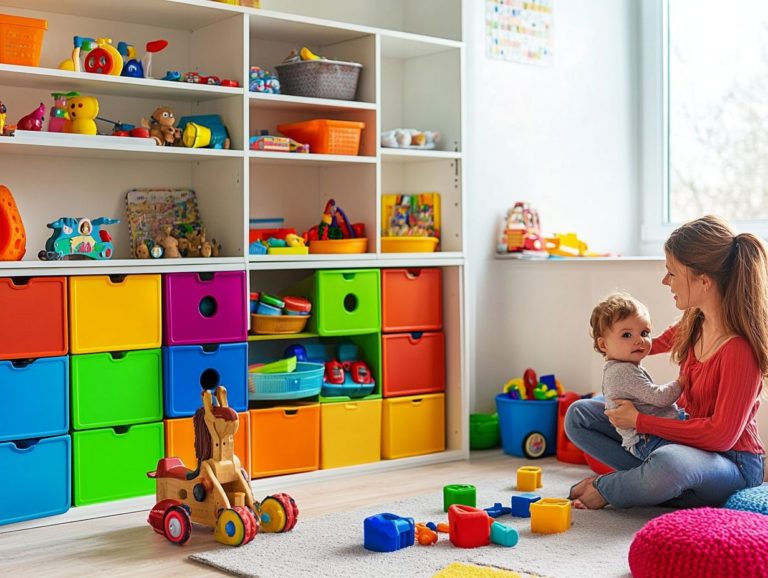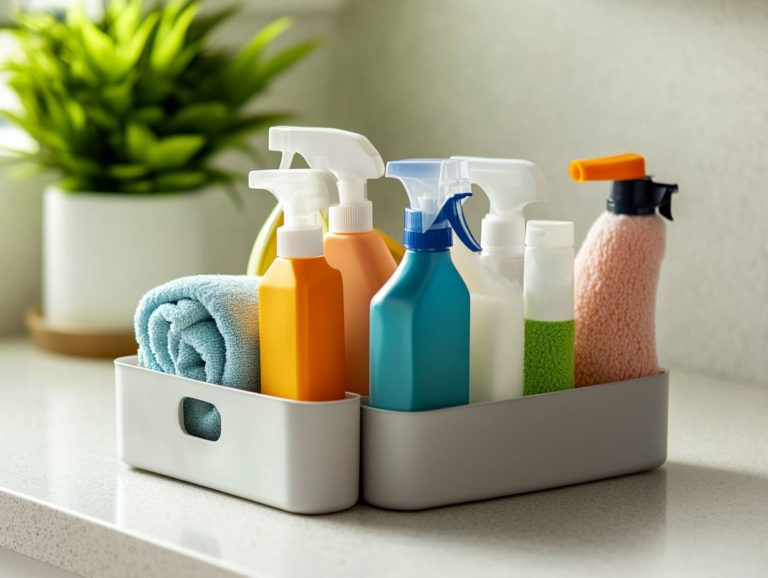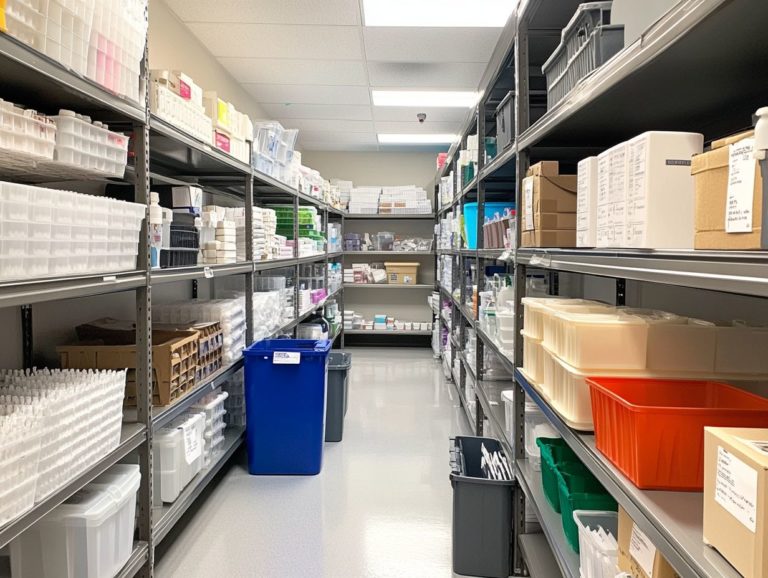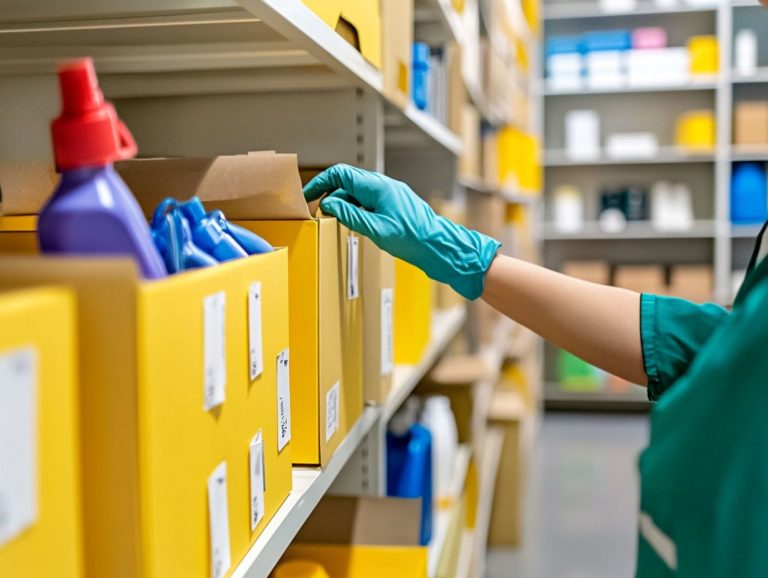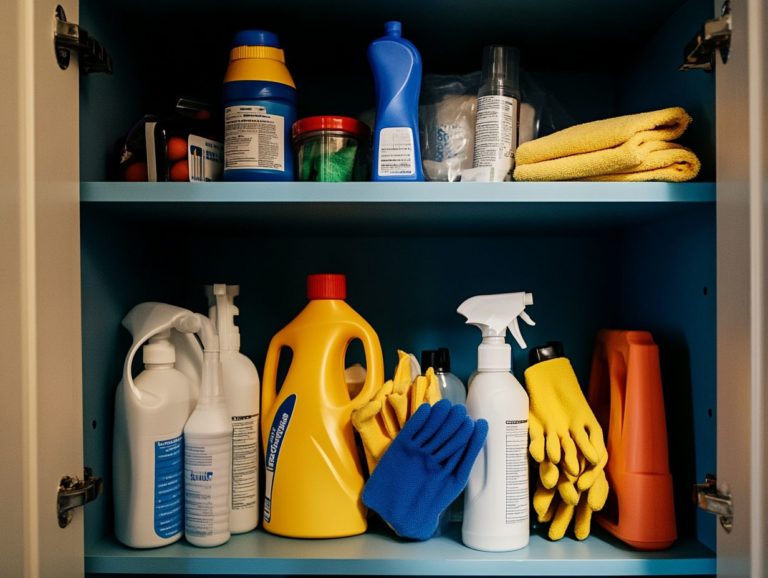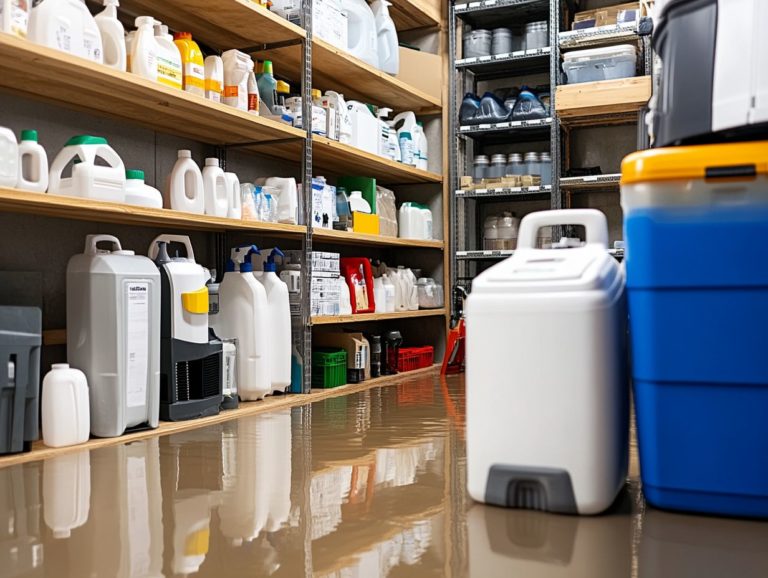How to Safely Dispose of Expired Cleaners
Proper disposal of expired cleaning products is essential for safeguarding both the environment and your personal safety. Many household cleaners harbor harmful chemicals that can pose a serious risk to human health and the ecosystem. Protecting your health and the environment is crucial!
Discover how to protect yourself and the planet as we explore the dangers of expired cleaners! This article highlights the dangers associated with negligence in disposing of these products, guides you on how to recognize when cleaners have expired, and outlines best practices for safe disposal.
Additionally, it emphasizes eco-friendly alternatives that are effective and safer for your home and the planet.
Contents
- Key Takeaways:
- Why Is It Important to Properly Dispose of Expired Cleaners?
- What Are the Risks of Improperly Disposing of Expired Cleaners?
- How to Identify Expired Cleaners?
- How to Safely Dispose of Expired Cleaning Products
- What Are Some Safer Alternatives to Common Household Cleaners?
- Frequently Asked Questions
- What are some common household cleaners that expire?
- Why is it important to properly dispose of expired cleaners?
- How can I tell if a cleaner has expired?
- Can I just throw expired cleaners in the trash?
- What is the best way to safely dispose of expired cleaners?
- Are there any alternative ways to safely dispose of expired cleaners?
Key Takeaways:
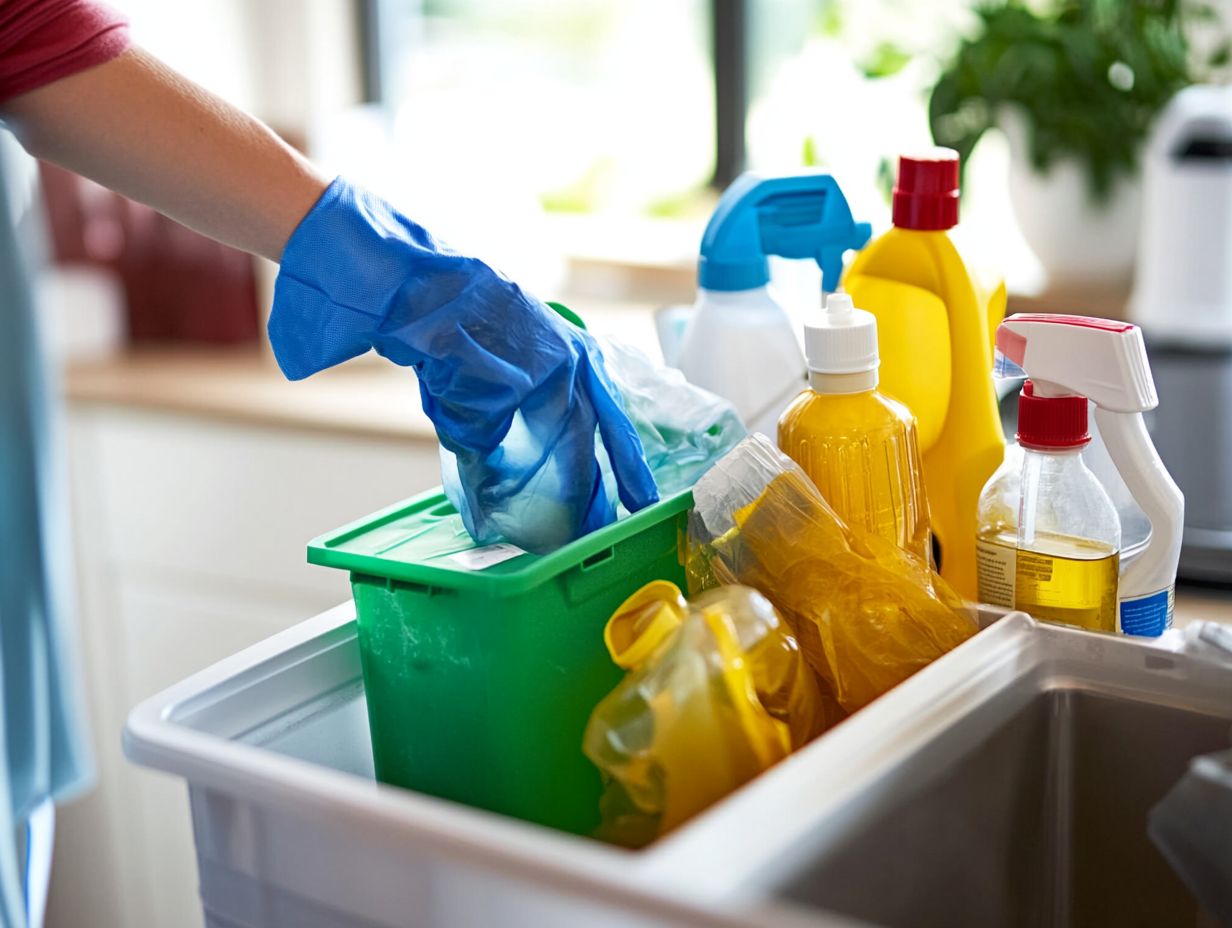
- Proper disposal of expired cleaners is crucial to protect the environment and human health.
- Improper disposal of expired cleaners can release harmful chemicals into the environment.
- Check local regulations and contact waste management facilities for safe disposal options. Consider alternative uses or safer alternatives like vinegar, baking soda, lemon juice, and essential oils. Always follow proper guidelines when disposing of hazardous waste.
Why Is It Important to Properly Dispose of Expired Cleaners?
Properly disposing of expired cleaning products is essential for cultivating a safe and healthy environment. Many household cleaning items harbor toxic chemicals that can pose significant health risks to humans and wildlife if not discarded correctly.
When these cleaning agents are improperly disposed of, they contribute to large amounts of waste that is dangerous, exacerbating environmental pollution and potentially leading to air, water, and soil contamination.
Therefore, understanding the significance of proper disposal not only safeguards your health but also fosters living in a way that helps the environment.
What Are the Risks of Improperly Disposing of Expired Cleaners?
Improper disposal of expired cleaners can create substantial risks for both your health and the environment, setting off a chain reaction of negative consequences.
When you toss out cleaning products especially those packed with toxic chemicals like chlorine bleach or certain disinfectants and send them to landfills or down your drains, you risk them leaching into the soil and water supply. This can lead to soil contamination and water pollution.
These hazardous substances can contribute to air pollution when volatile compounds (substances that easily evaporate and can pollute the air) escape into the atmosphere. This puts wildlife at risk and poses serious health threats to nearby communities.
What Chemicals are Found in Common Household Cleaners?
Common household cleaners may seem like a solution to your cleaning woes, but many of the chemicals they contain are far from benign. Take multi-surface cleaners, for example; they often include surfactants (substances that help break down dirt and grease), solvents, and preservatives that do a great job of cleaning but can also pose serious health risks if inhaled or ingested.
Disinfectants are typically packed with potent chemicals like chlorine bleach, which can be detrimental to both human health and the environment. Even everyday staples like fabric softeners and dish soaps can contain fragrances and dyes that add to the toxic burden in your home.
Research increasingly shows that prolonged exposure to these chemicals might lead to respiratory issues, skin irritations, or even long-term neurological problems. Consider ammonia, which is commonly found in many glass cleaners; inhaling concentrated amounts can cause severe respiratory damage.
Fortunately, there are natural cleaning alternatives that can be just as effective without the associated health risks. Ingredients like vinegar, baking soda, and essential oils can provide powerful cleaning solutions without compromising your well-being.
By choosing eco-friendly cleaners or whipping up homemade alternatives, you can significantly lower your exposure to harmful substances and create a healthier living environment for yourself and your family.
Don t just read take action! Properly dispose of your expired cleaners today and help create a safer environment for everyone!
How Do These Chemicals Affect the Environment and Human Health?
The chemicals lurking in common cleaning products can wreak havoc on both the environment and your health. When these substances seep into the ecosystem, they can cause serious damage, leading to soil contamination and water pollution that jeopardizes wildlife habitats and human health.
For example, toxic chemicals can disrupt aquatic life and poison fish and other organisms. This ultimately sends ripples through the food chain. Exposure to these harmful agents can bring about various health issues, including respiratory problems, skin irritations, and even long-term chronic conditions.
Not only do these harmful substances compromise the quality of natural water sources, but they can also contaminate your drinking water, posing significant risks to your health. Volatile organic compounds (VOCs), which are chemicals that can easily evaporate into the air, are commonly found in many cleaners. They can degrade air quality and contribute to urban smog, leading to respiratory conditions that can affect populations, especially in densely populated areas. Effective disposal methods and eco-conscious choices are imperative to mitigate these issues.
Wildlife faces its own set of dangers. Chemicals like phosphates can trigger algae blooms that suffocate aquatic ecosystems, while pesticides can wipe out vital pollinator populations essential for plant reproduction.
By choosing safer, eco-friendly cleaning alternatives, you can make a real difference by creating a healthier environment for everyone humans and wildlife alike.
How to Identify Expired Cleaners?
Identifying expired cleaning products is crucial for maintaining a safe and efficient household. Most cleaning supplies feature expiration dates on their labels, indicating the timeframe within which the product is expected to function optimally. Don t wait too long! Regularly check your cleaning supplies to ensure they re still effective.
As time goes on, the chemical compositions may deteriorate, resulting in reduced cleaning efficacy and the possibility of harmful reactions when used beyond their expiration. By routinely checking these labels, you can keep your cleaning products organized while ensuring that you are employing safe and effective agents within your home.
What Are the Expiration Dates for Different Types of Cleaners?
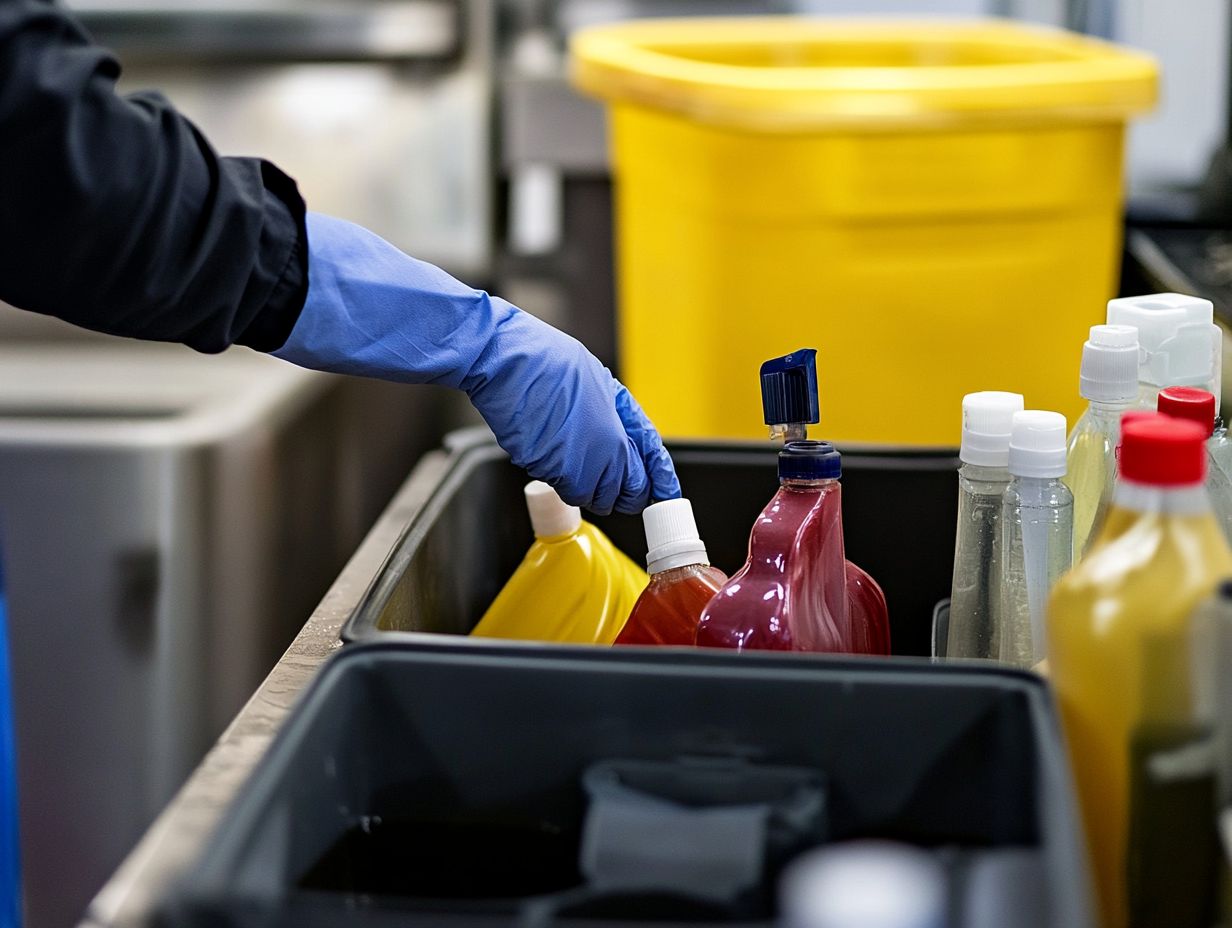
Expiration dates for various types of cleaners can differ significantly, reflecting their unique chemical compositions and intended uses. For example:
- Multi-surface cleaners typically have a shelf life of one to two years.
- Bleach-based products may only last up to six months once opened.
- Eco-friendly options like vinegar and baking soda generally don t have strict expiration dates, but they can lose their effectiveness over time.
Grasping these expiration timelines is essential for ensuring effective cleaning and minimizing the use of outdated products in your home. Store cleaning products in the right containers to help them last longer.
The longevity of cleaners can be heavily influenced by their storage conditions. Products kept in damp or hot environments may degrade more quickly, losing potency and potentially becoming hazardous. It s prudent to store all cleaners, particularly conventional ones with harsh chemicals, in a cool, dry place away from direct sunlight.
Adhering to expiration guidelines not only enhances your cleaning results but also safeguards the well-being of your household members and pets. Make it a habit to check and replace older products regularly. This keeps your cleaning arsenal effective and safe!
How Do You Know If a Cleaner Has Expired?
Determining whether your cleaner has expired can be straightforward if you know what to look for. One reliable indicator is the product label, which usually includes an expiration date or a best by guideline.
Keep an eye out for changes in color, texture, or smell. For instance, if a cleaner has thickened or separated, it may no longer be effective. Recognizing these signs ensures you’re using only safe and effective cleaning products in your home.
Pay attention to unusual odors. If a cleaner has developed a rancid or off smell, it s a clear sign that the ingredients may have deteriorated.
To extend the shelf life of your cleaning products, store them in a cool, dry place away from direct sunlight and heat. Keeping the original cap tightly sealed will also help prevent moisture from entering the container, which could lead to degradation.
Always use protective gear when handling potentially harmful chemicals. Regularly check labels and follow proper storage tips to enhance the effectiveness of your cleaning supplies over time.
How to Safely Dispose of Expired Cleaning Products
Safely disposing of expired cleaners involves specific steps to mitigate both environmental impact and health risks.
Begin by reviewing your local regulations regarding hazardous waste disposal; these guidelines outline the appropriate methods for handling expired cleaning products.
Many communities have waste management facilities that accept hazardous materials, providing a secure disposal route. Check out household hazardous waste collection programs to ensure your expired cleaners are managed responsibly.
Safeguard your health and the environment by following these safe disposal practices.
1. Check Local Regulations and Guidelines
Your first step in safely disposing of expired cleaning products is to check local regulations and guidelines. These can vary significantly from one area to another.
Many municipalities enforce strict rules regarding hazardous waste disposal, including procedures for handling toxic cleaning agents. Familiarize yourself with these regulations to minimize environmental impact and adhere to community standards.
Visit your city or county’s official website, where you can find valuable information about waste disposal, including sections for hazardous materials. Community health departments or environmental agencies often provide essential resources for managing and discarding these products safely.
You can also check the Environmental Protection Agency’s website to identify what qualifies as hazardous waste and discover the best disposal practices. Compliance with these regulations is crucial for protecting public health and local ecosystems.
2. Contact Your Local Waste Management Facility
Contacting your local waste management facility is essential for the proper disposal of expired cleaning products. These facilities can provide detailed information on acceptable disposal methods for hazardous materials, including drop-off locations and associated fees.
Establishing communication with these authorities enhances your understanding of disposal practices and helps you stay compliant with local regulations. When you reach out, prepare a list of questions about the types of materials they accept, guidelines for storage before disposal, and any upcoming hazardous waste collection events.
Inquire about educational resources or initiatives they offer to promote environmentally friendly practices. Engaging in this dialogue fosters a sense of community responsibility and equips you with valuable insights for maintaining a sustainable environment.
3. Use a Household Hazardous Waste Collection Program
Participating in a Household Hazardous Waste Collection Program presents an excellent opportunity for you to dispose of expired cleaning products safely and responsibly. These programs are specifically designed to assist residents in managing hazardous waste.
They offer designated drop-off days and locations tailored for hazardous waste. By taking advantage of these community resources, you ensure that your expired cleaners are handled appropriately, thereby reducing the risk of environmental contamination and championing eco-friendly practices.
To locate such programs in your area, begin by exploring your local government’s website or reaching out to public works departments. Many municipalities host seasonal collection events or maintain permanent drop-off sites where you can safely dispose of your waste.
Getting involved in these community initiatives not only contributes to a cleaner environment but also cultivates a sense of responsibility among residents, encouraging sustainable habits. Your participation can significantly reduce hazardous waste in landfills.
This leads to healthier living spaces and ultimately benefits the ecosystem.
Don t wait! Discover the resources available near you today for a cleaner planet.
4. Dilute and Dispose of Small Amounts of Cleaners
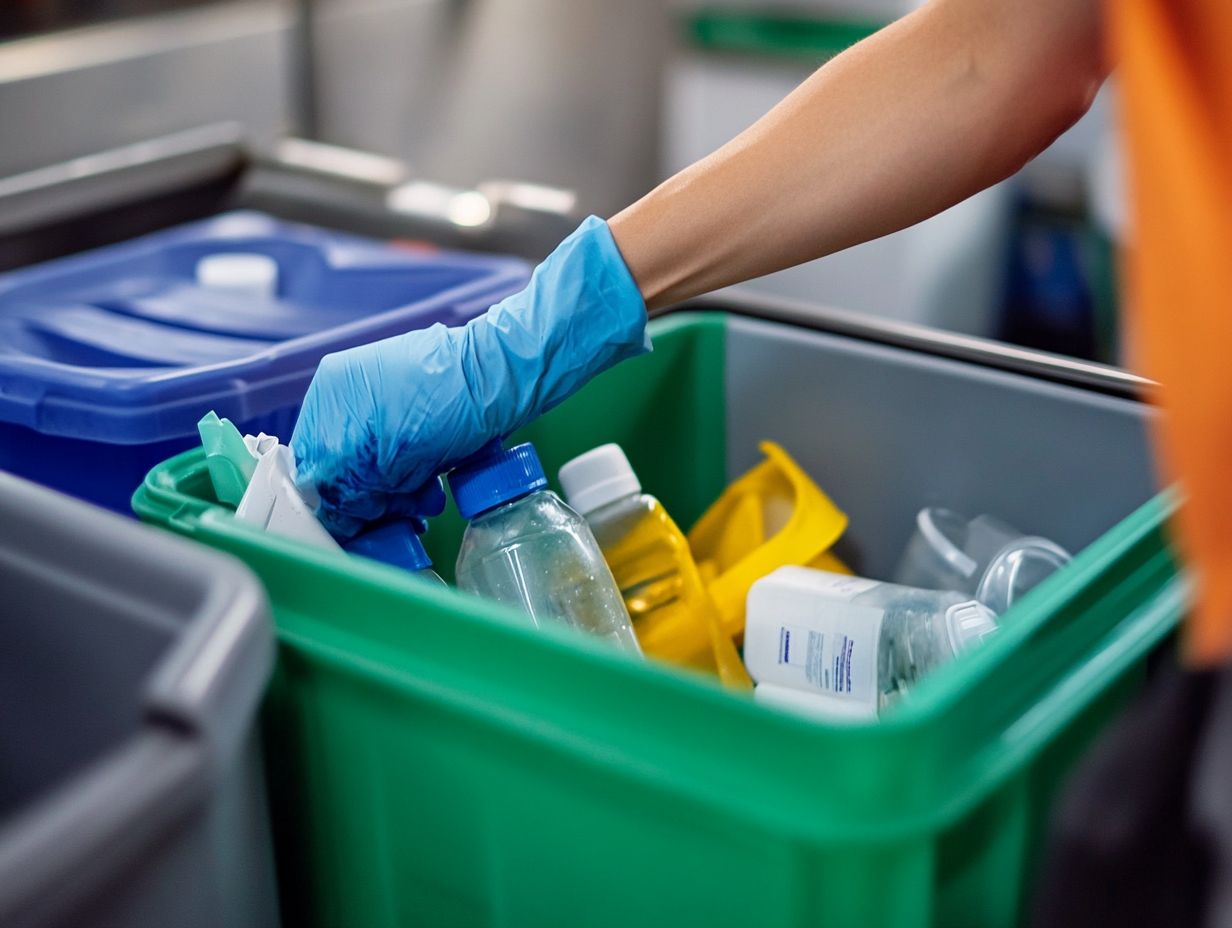
For small amounts of expired or unused cleaning solutions, consider dilution (mixing with water to reduce concentration) and careful disposal as viable options. By following dilution guidelines, you can effectively minimize the concentration of harmful substances before disposal.
It’s crucial to proceed with caution, ensuring that your process is safe and won’t harm the environment or your community. After mixing the product with water, think about using a container with a secure lid for the diluted solution to prevent any accidental spills.
Always check local regulations regarding disposal; some municipalities may permit diluted products to be poured down sinks or toilets, while others might require specific disposal methods.
If you’re unsure, reach out to local waste management authorities immediately for safe disposal advice!
Keep in mind that these practices not only safeguard your health but also promote the safety of others and protect the ecosystem.
5. Consider Alternative Uses for Expired Cleaners
Before you toss out those expired cleaners, take a moment to consider some alternative uses that might repurpose these products in a safe and effective manner. Many cleaning agents still have a role to play, even after their expiration.
For instance, diluted vinegar can work wonders as a deodorizer or a substitute for fabric softener.
By exploring eco-friendly choices and creative ways to utilize expired cleaning products, you can significantly reduce waste and contribute to sustainable living practices.
Think about it: an old bottle of baking soda, even past its prime, can be a gentle abrasive for scrubbing pots and pans or a reliable solution for banishing stubborn odors from your fridge.
Similarly, expired glass cleaners can be diluted with water and repurposed to give your mirrors or windows a sparkling shine without the worry of harmful chemical exposure.
By thinking outside the box, you can discover innovative ways to extend the life of these products, minimizing your environmental footprint while benefiting from resources that would otherwise go to waste.
What Are Some Safer Alternatives to Common Household Cleaners?
Exploring safer alternatives to conventional household cleaners can greatly reduce health risks and minimize your environmental footprint while still ensuring effective cleaning.
Eco-friendly options like vinegar and baking soda are not only remarkably effective but also non-toxic, serving as excellent substitutes for those harsher cleaning products.
Natural ingredients like lemon juice and hydrogen peroxide disinfect and deodorize your space without introducing harmful chemicals into your home.
Embracing these alternatives not only promotes a healthier living environment but also aligns with a more sustainable lifestyle.
1. Vinegar and Baking Soda
Vinegar and baking soda are versatile and effective eco-friendly cleaning solutions. Vinegar serves as a natural disinfectant and deodorizer, perfect for cleaning glass and countertops.
Baking soda acts as a powerful abrasive, tackling stubborn stains and odors. When combined, they create a natural cleaning powerhouse that is safe for your home and the environment.
They can be used in countless ways, making them essential in your cleaning arsenal. Mix equal parts of vinegar and water for a streak-free shine on mirrors and windows. A paste of baking soda and water effectively scrubs away grime from sinks and bathtubs.
Pouring baking soda followed by vinegar can help break down clogged drains, all without resorting to harsh chemicals typically found in commercial products. By incorporating these eco-friendly solutions into your regular cleaning routines, you not only achieve a fresher living space but also contribute to a healthier planet.
2. Lemon Juice
Lemon juice is an exceptional eco-friendly cleaning solution. Its natural disinfectant properties and delightful fragrance make it a popular choice.
The high acidity cuts through grease and grime, making it effective for cleaning kitchen surfaces. With its antibacterial qualities, lemon juice is an excellent choice for sanitizing areas prone to germs, such as cutting boards and countertops.
Lemon juice serves many purposes in cleaning. It can deodorize the refrigerator, remove fabric stains, and add shine to metal fixtures. Incorporating lemon juice into your household cleaning routine is easy; simply mix it with baking soda to create a potent scrubbing paste, or combine it with vinegar for an even more formidable cleansing agent.
Lemon juice boosts the effectiveness of other natural cleaners. It also leaves behind a refreshing aroma, making it a favorite in eco-conscious households.
3. Hydrogen Peroxide
Hydrogen peroxide is a go-to eco-friendly cleaning agent. It works as a natural disinfectant and stain remover. You can confidently use it to sanitize surfaces, whiten laundry, and tackle stubborn stains on carpets.
Its bubbling action works wonders, lifting dirt and debris while effectively obliterating germs and bacteria making it an essential ally in your household cleaning routine.
Hydrogen peroxide decomposes into water and oxygen, leaving no harmful residues. This promotes a healthier home environment and supports eco-conscious cleaning practices.
This versatile cleaner disinfects countertops, bathrooms, and freshens the refrigerator. Always follow dilution guidelines for higher concentrations. Store it in a cool, dark place to maintain potency. Use dark containers to protect it from light exposure, ensuring that it performs consistently each time you reach for it.
4. Essential Oils
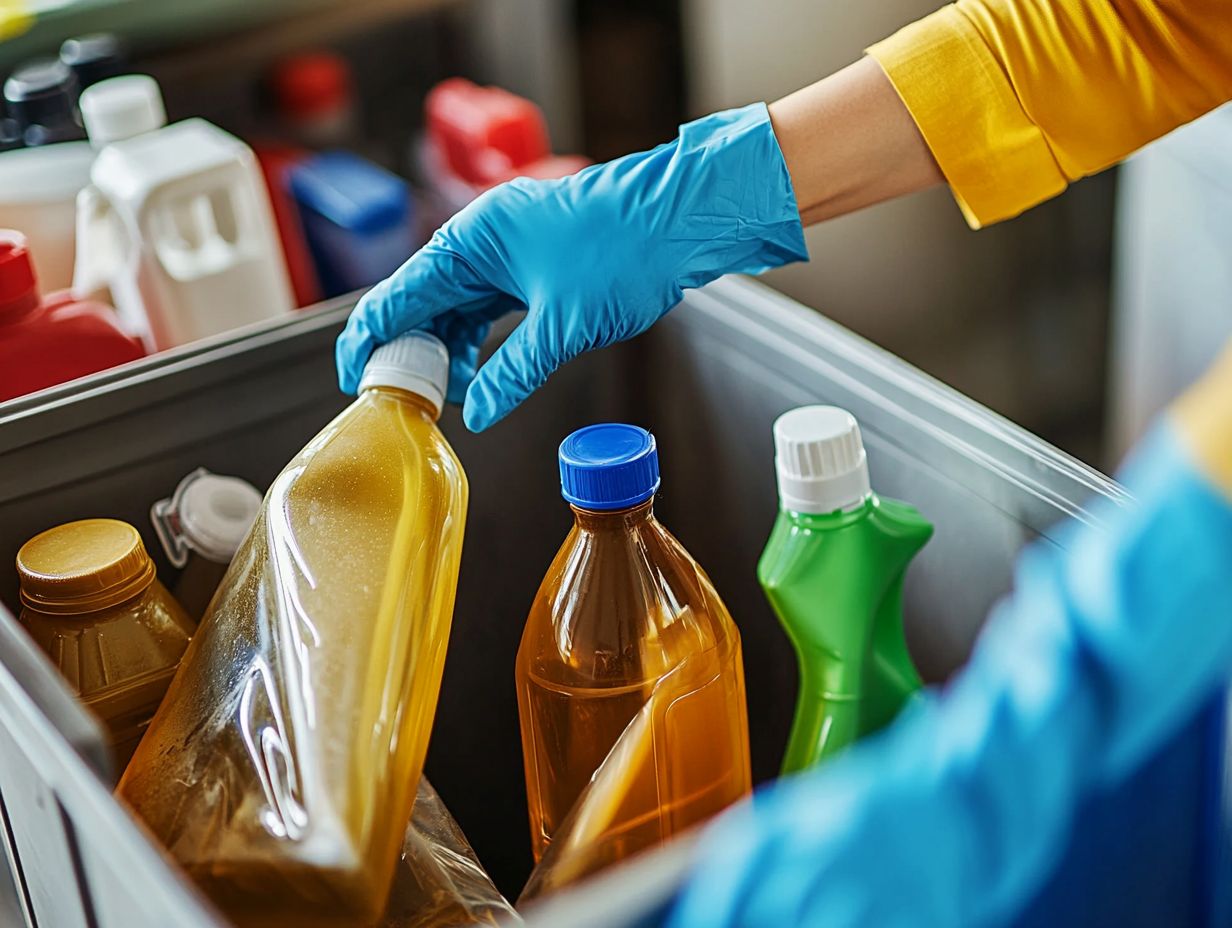
Want a fresh-smelling home? Essential oils are your new best friend for natural cleaning! They are increasingly popular for natural cleaning products due to their delightful scents and formidable antibacterial properties. Oils like tea tree, lavender, and eucalyptus not only provide a refreshing aroma but also enhance the effectiveness of your homemade cleaning solutions.
By incorporating essential oils into your cleaning routine, you’re embracing a more environmentally friendly way of living while infusing your home with inviting fragrances.
These oils effectively eliminate harmful pathogens, improving air quality in your living space. For example, lemon essential oil is great for cutting through grease, while peppermint oil is effective against common household pests.
Creating your own DIY cleaning solutions is easy just mix a few drops of your chosen oil with water and a natural soap base in a spray bottle. This approach harnesses their powerful properties without resorting to harsh chemicals found in commercial products. It makes you feel better about your cleaning choices while contributing to a healthier home environment.
Frequently Asked Questions
What are some common household cleaners that expire?
Some common household cleaners that expire include bleach, ammonia-based cleaners, and disinfectant wipes. Dish soap, fabric softener, laundry detergents, stain removers, and wood polish can also expire.
Why is it important to properly dispose of expired cleaners?
Expired cleaners can become less effective or even harmful if used past their expiration date. Proper disposal ensures they do not pose a risk to your health or the environment, helping to avoid air pollution, soil contamination, and water pollution.
How can I tell if a cleaner has expired?
Check the expiration date on the label or packaging. If there s no expiration date, look for signs of separation, discoloration, or a strong odor these are indications that the cleaner has expired. Always follow disposal guidelines to protect the environment.
Can I just throw expired cleaners in the trash?
No, it is not recommended to throw expired cleaners in the trash. They can still be harmful to the environment and should be properly disposed of as hazardous waste.
What is the best way to safely dispose of expired cleaners?
The best way to dispose of expired cleaners is to take them to a hazardous waste facility. Many cities have designated drop-off locations for household hazardous waste. Contact your local waste management company for guidance on effective disposal methods. Additionally, recycling containers that held non-hazardous cleaners can contribute to waste reduction.
Are there any alternative ways to safely dispose of expired cleaners?
Some cleaners, such as vinegar and baking soda, can be diluted with water and safely poured down the drain. However, this method may not be suitable for all types of cleaners, so it is best to check with your local waste management company first. Following proper guidelines is crucial to ensuring environmental safety.
Some cleaners, such as vinegar and baking soda, can be diluted with water and safely poured down the drain. However, this method may not be suitable for all types of cleaners, so it is best to check with your local waste management company first.

